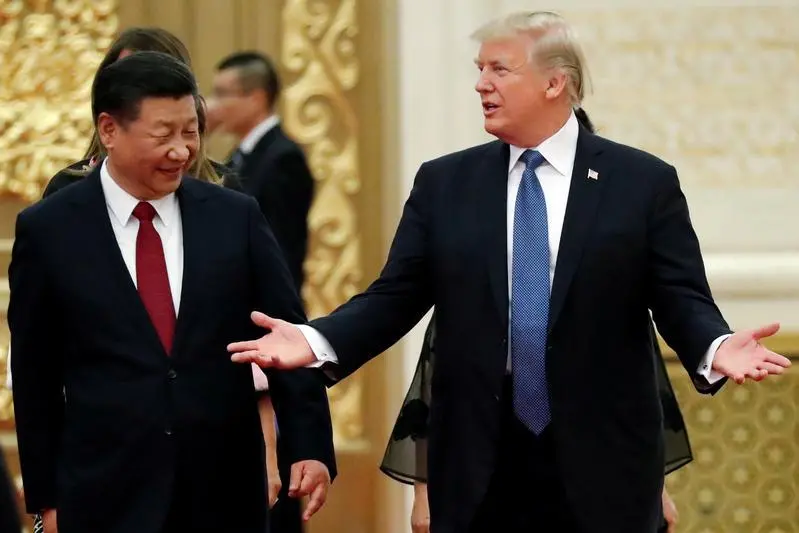PHOTO
The dispute began as a war of words and became a messy skirmish of retaliatory tariffs — souring already tense relations between Beijing and Washington.
However, with it came an inevitable parade of doomsayers heralding the fateful descent of a trade, financial and digital “iron curtain” between the world’s largest economy and its fastest growing. “Decoupling” they called it, causing alarm in some circles, intrigue in others and cursory dismissals from the rest. Fortunately, these portentous declarations will soon fade in response to fast-changing realities.
Our world is in serious need of collaboration and cooperation between the US and China in order to address mounting crises from an oil price crash, a global pandemic, and the still discernible vulnerabilities left by a now decade-old financial crisis.
According to the International Monetary Fund (IMF), a third of economies in the Middle East and Central Asia had still not returned to their pre-2008 levels of economic activity by the end of last year — and then the pandemic struck. Many countries are not expected to recover to pre-pandemic levels until at least 2024, with global trade plunging by 12 percent.
As a new administration takes over in Washington, the calls to either deal decisively with China or settle for some awkward form of detente have only become more raucous. The obvious dovish pragmatism of the incoming Joe Biden administration will certainly opt for the latter, since a continuation of the previous administration’s aggressive, transactional, clientelistic diplomacy does not bode well for a battered world economy.
Expectations of a sudden irreparable rift forming between East and West are basically moot at this point, which comes as a relief to most of the world — particularly the Middle East. The last thing the planet needs is a replay of a world once again divided into antagonistic halves only a generation after the fall of the Berlin Wall.
China has fared better than most other countries and its economy is expected to grow by about 5 percent next year, even as global output is expected to be uneven over the next few years. As most of the West continues to grapple with successive waves of the out-of-control spread of the virus, China has been busy accelerating its overseas designs. For example, it spearheaded negotiations for, and the eventual signing of, the Regional Comprehensive Economic Partnership (RCEP), a trade agreement between 15 Asia-Pacific countries.
RCEP supplants North America, and even the European Union, as the world’s largest trading bloc, accounting for just over a quarter of global output, or about 30 percent of global gross domestic product. Combined with the Belt and Road Initiative (BRI) — hundreds of billions of dollars in infrastructure investments across the Eurasian continent, Africa and the Americas — it means global trade is poised to shift toward East Asia and away from the West.
For now, however, grand geopolitical rivalries and their implications will have to take a back seat to providing immediate relief and jump-starting stalled economies, especially across the developing world.
Most nations are desperate to recover because failure to do so will unleash an overwhelming tide of social unrest and political uncertainty. The number of impoverished people continues to grow, with millions out of work and, in some cases, without adequate social safety nets.
It is these exigent realities that are defining priorities for most governments in the Middle East, and not the growing tide of Sinophobia stemming from Western capitals. Nonetheless, proponents of decoupling will not be silent and every maneuver by Beijing will be intensely scrutinized and rendered adversarial, and therefore deserving of an equal response.
Certainly, some of the posturing by Beijing is very concerning and, should it remain unchecked, could cause some sleepless nights for the new occupants of the White House. The US is yet to respond to a $400 billion lifeline thrown by China to the sanctions-riddled Iranian economy. This was followed by Beijing swiftly enacting an Export Control Law to regulate the export of sensitive materials, weapons and related technologies overseas — not long after the expiration of a UN arms embargo on Iran.
If the Biden administration is keen on renegotiating a freeze on Iran’s nuclear ambitions, Tehran’s embracing of China will likely make those negotiations a lot more challenging. On the other hand, China will have to tread carefully to avoid jeopardizing the positive returns from its engagement with US-backed, anti-Tehran Gulf states.
Such is the messy calculus across the Middle East, where countries must carefully balance national security and economic priorities. US energy self-sufficiency has left the energy-dense region looking elsewhere, mostly Asia, to export its hydrocarbons. It is unsurprising that the Middle East is home to six of China’s Top 10 oil suppliers, and stands to benefit enormously from the very ambitious $1 trillion BRI — if they are not already being swarmed by Chinese investments to develop ports, oil facilities, petrochemical depots, power stations, industrial zones, and logistics hubs. A sudden rift or the imposition of some kind of iron curtain would be very catastrophic for all.
Since 1945, the Middle East has benefited, and will continue to do so, from a steadfast US security umbrella, despite its flawed foundations reminiscent of Cold War-era “domino theory” thinking. Relative “successes” — such as engineering a defeat of the Soviet Union in its invasion of Afghanistan, two Gulf Wars and the containment of Iran — would inform a policy shift from attritional counterbalancing to misguided regime change disguised as a “War on Terror.”
Now, however, the US appears intent on reducing its footprint overseas, despite fierce opposition by partners in the region, allies in Europe, and interest groups at home. It is unlikely a new administration will reverse this trend given the obvious domestic political appeal of “ending forever wars.” However, an abrupt exit would rob the US of any standing it can use to demand that the region rebuff an attempt by China to consolidate its fast-growing presence, unchecked by Washington’s ambivalence and looming absence.
Besides, having spent $65-70 billion annually to foster the region’s security and stability — albeit mostly to the benefit of China — a complete US withdrawal would be financially unwise and geostrategically imprudent, given Beijing’s lack of interest in actively fostering security cooperation with the Middle East.
China, on the other hand, cannot expect the region to abandon existing security and military arrangements with the US in exchange for trade or investment incentives, should relations with Washington continue to sour. Even pushing for the region to adopt its currency to conduct trade is an impossible sell, despite the benefits economic cooperation has brought, and will bring, to the Middle East. No country will want to be isolated and find its security needs heavily dependent on a non-committal Beijing and its proliferation of debt diplomacy.
If the region is to skirt the worst of a widening chasm between East Asia and the West, it must adopt a pragmatic approach that favors neither side. After all, leaning one way or the other would be detrimental to trade, economic, and security policies at a time when most countries in the region face multiple political, social, and economic crises not helped by a global pandemic.
The only way the Middle East can stay clear of the fray is to insist on a symbiotic confluence of interests.
The region needs export markets for its energy resources in order to spearhead economic growth, implement much-needed reforms, and build greater resilience to global shocks. China is hydrocarbon-poor but financially very well endowed and has already invested heavily on the requisite infrastructure to import crude from the Middle East.
Despite achieving relative energy self-sufficiency, the US still needs to maintain a security presence in the Middle East beyond counterterrorism operations and as a check on Iran’s regional destabilization activities — it also prevents China and Russia from coordinating hegemonic designs in the shadow of a complete US exit.
- Hafed Al-Ghwell is a non-resident senior fellow with the Foreign Policy Institute at the John Hopkins University School of Advanced International Studies. He is also senior adviser at the international economic consultancy Maxwell Stamp and at the geopolitical risk advisory firm Oxford Analytica, a member of the Strategic Advisory Solutions International Group in Washington DC and a former adviser to the board of the World Bank Group. Twitter: @HafedAlGhwell
Copyright: Arab News © 2020 All rights reserved. Provided by SyndiGate Media Inc. (Syndigate.info).





















